Research Article
Volume 3 Issue 5 - 2018
Assessment of Reasons to Choose Dentistry and the Choice of Career Among Dental Graduates in a Dental Institution in Bangalore- A Cross Sectional Survey
1Professor and HOD, Department of Public Health Dentistry, Vydehi Institute of Dental Sciences, India
2Senior Lecturer, Department of Public Health Dentistry, Vydehi Institute of Dental Sciences, India
3PG Student, Department of Public Health Dentistry, Vydehi Institute of Dental Sciences, India
2Senior Lecturer, Department of Public Health Dentistry, Vydehi Institute of Dental Sciences, India
3PG Student, Department of Public Health Dentistry, Vydehi Institute of Dental Sciences, India
*Corresponding Author: Navami Ashok, Rajiv Gandhi University of Health Sciences, Vydehi Institute of Dental Sciences, Nallurahalli, Whitefield, Bangalore, Karnataka, India.
Received: September 22, 2018; Published: October 06, 2018
Abstract
Aim: To assess the reasons to choose dentistry and the various career perspectives opted by dentists post under graduation.
Methods and Material: A cross sectional descriptive survey was conducted in a Dental Institution in Bangalore. The survey was carried out using self-administered pretested questionnaire to the study group of 222 dentists who graduated during the academic years 2007-2011 through an online survey form. The 14-item questionnaire consisted of questions regarding the reasons for choice of dental course, career options, obstacles faced post-completion of under-graduation, present career and satisfaction with current profession. The purpose of the study was explained to the participants and confidentiality was ensured. Statistical analysis was done using counts and percentages.
Results: Analysis of the motives for choosing dentistry as a career revealed that majority, 41% of the study participants chose dentistry as they could not secure an MBBS seat, followed by encouragement from family and friends (26%). Only 31% of the study participants chose dentistry out of their own interest. Among all the graduates, 56.2% are working in dentistry 26.3% are doing post-graduation in dentistry, 7.7% have quit dentistry and is pursuing career in other domains, while 9.8% are not working currently.
Conclusions: The study showed that most graduates did not opt dentistry out of their own interest and agreed that despite the participants’ perception of dental career as stressful not so fruitful in terms of income and less satisfaction with career, they showed a positive perception regarding dental profession.
Key words: Career choice; Dentistry; Dental graduates
Abbreviations: If there are any abbreviations in the article; they have to be mentioned
Introduction
It is every individual's dream of obtaining basic sustenance, shelter and clothing through a socially acceptable profession. And if this livelihood is earned through a profession, which is service oriented, then there is an added sense of satisfaction along with fulfilment. One such noble profession is dentistry, which deals with providing oral health care for people [1]. In ancient history of Indian medicine and Ayurveda, dentistry hadn’t forged itself as a separate entity, as it existed as a barometer for good health, but only as a part and parcel of medicine. Today, the landscape has changed many folds, for dentistry is both - Treating the cause and at the same time enhancing the aesthetics [2].
In India, before 1980, there were only 39 dental colleges with the number of dentists available being a bare minimum. But 1980 onwards, the general picture has changed drastically, as the number of dental colleges have mushroomed in India. By 2013, there were 42 government dental colleges and 259 private dental colleges approved by the Dental Council of India producing over 25000 dental graduates every year to serve the oral health needs of the growing population [3].
However, the country’s population has increased three folds since, also accounting to the dentist population shooting up 3000 times. The numbers eventually take its toll on the budding dentists, as the cloud of uncertainty leads to anxiety and subdues them to stress. This feeling grows substantially as a student progresses each year only to reach its zenith during internship accounting to the cumulative burdens (financial, social, pyschological and the subject itself) faced till their graduation [4]. Also very less number of posts are available for dentists in the government sector. Only 5% graduated dentists are working in the government sector. Urban sector may appear like the gold mine, but individual-practice has become extremely difficult, ailing to saturation of the dental market. On the flip side, private clinics in rural areas is a good option, but not practically viable accounting to minimal oral health awareness midst the rural population [5].
So, choosing a field of study becomes elementary, for a wrong choice causes a decrease in a country's scientific level, waste of human and economic resources, incuriosity and lack of student motivation toward social issues and mental disorders in the student's personal and social life [6]. The fundamental information about any career is very important for students in deciding the one that fit their abilities and characteristics [7]. While joining under graduation, the students are attracted toward the course because of the social and professional status, increased quality of life and income, others’ recommendations, and to play a role in community health care services [8]. Investigating the motives of health students contributes to a better understanding of how they direct their studies; plan their career; to guide them; and to determine the role they play in society. In a broader sense, such investigations may be helpful for planning and evaluating processes in undergraduate health education and health care services, as these issues may influence institutional curriculum, teaching process and profiles of the future professionals [9].
Increasing number of undergraduate seats with decrease in the number of merit seats/higher fees demand for post-graduation remains a challenge today for majority of the dental graduates. Moreover, less dental job opportunities in India, increased budding of new private dental clinics and less recognition of dental qualification overseas, has created intense pressure on the dental graduates. Research into the career options of dental profession is vital to inform dental workforce policy, administrators, and educators to identify the reasons for improving the quality of dental profession in India to uplift the career of Indian dentists [8].
Materials and Methods
A descriptive cross sectional survey was carried out among the graduates who finished BDS course from a dental institution in Bangalore. Five batches (2007-2011) with a strength of 60 students per batch were considered among which a convenient sample of 222 qualified the inclusion criteria, i.e. enrolment for BDS course during the academic years 2007-2011 and graduated by March 2017. The study proposal was approved by Institutional Review Board of Vydehi Institute of Dental Sciences and Research Centre, Bangalore.
The questionnaire was self-designed and pretested with both close ended and open ended questions containing demographic details and questions on the reasons for choosing dental course, career options, obstacles faced post-completion of under-graduation present career and satisfaction with current profession. The face and content validity of the 14-item questionnaire was checked by the dental faculty members. Test–retest was used to check the reliability. Cronbach’s alpha value of 0.80 suggested good internal consistency of the questionnaire. Participation was voluntary. The questionnaire was administered through online survey using Google Forms where the link was sent to the participants via email, WhatsApp and Facebook messenger. The study was conducted over a period of two months i.e. August-September 2017. The final analysis was done by the investigator.
Statistical analysis was done using descriptive statistics for counts and percentages. The Statistical software SPSS 22.0 was used for the analysis of the data and Microsoft Word and Excel have been used to generate graphs, tables etc.
Results
I. Response Rate and Demography of Participants
The questionnaire was administered to 222 dentists of which 194 responded accounting to a response rate of 87%. The age of the participants ranged between 24 and 32 years (average 28 years) and majority were female (68.5%). Maximum response was received from batches 2009 and 2010, majority of the participants were married (54.1%) with 20.1% of their spouses being in medical profession,15.5% engineers and 13.4% in other professions like business, marketing etc. (Table 1).
The questionnaire was administered to 222 dentists of which 194 responded accounting to a response rate of 87%. The age of the participants ranged between 24 and 32 years (average 28 years) and majority were female (68.5%). Maximum response was received from batches 2009 and 2010, majority of the participants were married (54.1%) with 20.1% of their spouses being in medical profession,15.5% engineers and 13.4% in other professions like business, marketing etc. (Table 1).
| Demographic details | Number (Percentage) | |
| Gender | Male | 61 (31.5%) |
| Female | 133 (68.5%) | |
| Response per batch | 2007 | 30 (15.46%) |
| 2008 | 26 (13.40%) | |
| 2009 | 47 (24.22%) | |
| 2010 | 51 (26.28%) | |
| 2011 | 40 (20.61%) | |
| Marital Status | Married | 105 (54.12%) |
| Unmarried | 89 (45.87%) | |
| Occupation of spouse | Engineer | 30 (15.46%) |
| Business | 8 (4.12%) | |
| Doctor | 18 (9.27%) | |
| Dentist | 21 (10.82%) | |
| Marketing | 6 (3.09%) | |
| Others | 12 (6.18%) | |
Table 1: The distribution of participants according their demographic details.
II. Response Regarding Choice of Dentistry as a Career
Analysis of the motives for choosing dentistry as a career revealed that majority, 80 (41%) of the study participants chose dentistry as they could not secure an MBBS seat, followed by encouragement from family and friends, 50 (26%) [Figure 1]. Majority of the participants, 116 (59.8%) did not have any family background of dentists. Future earning was the driving force which influenced a majority of study participants, 73 (37.8%) in their choice of career.
Analysis of the motives for choosing dentistry as a career revealed that majority, 80 (41%) of the study participants chose dentistry as they could not secure an MBBS seat, followed by encouragement from family and friends, 50 (26%) [Figure 1]. Majority of the participants, 116 (59.8%) did not have any family background of dentists. Future earning was the driving force which influenced a majority of study participants, 73 (37.8%) in their choice of career.
III. Response Regarding the Circumstance after Completion of BDS
Regarding the immediate plans, the dentists had after completion of the course, majority i.e., 71 (36.5%) had planned to prepare for post-graduation entrance exam, followed 59 (30.2%) by who wanted to do associateship under an established dentist for experience. Only 7 (3.7%) of the study participants had plans to change their career immediately after completion of BDS. The participants were of the opinion that professional status and the job security ushers a person to pursue a post graduate degree in dentistry. Dissatisfaction with income was the major obstacle faced by dentists (N = 56, 29%) after graduation followed by inability to find a well-deserved job (N = 49, 25%) and lesser number of PG merit seats (N=49, 25%) [Figure 2].
Regarding the immediate plans, the dentists had after completion of the course, majority i.e., 71 (36.5%) had planned to prepare for post-graduation entrance exam, followed 59 (30.2%) by who wanted to do associateship under an established dentist for experience. Only 7 (3.7%) of the study participants had plans to change their career immediately after completion of BDS. The participants were of the opinion that professional status and the job security ushers a person to pursue a post graduate degree in dentistry. Dissatisfaction with income was the major obstacle faced by dentists (N = 56, 29%) after graduation followed by inability to find a well-deserved job (N = 49, 25%) and lesser number of PG merit seats (N=49, 25%) [Figure 2].
IV. Response Regarding Current Status of Career
Among all the graduates, 160 (82.5%) are continuing their career in dentistry and the distribution based on the present career is given in Figure 3. The participants who changed their career are pursuing in business, hospital administration, interior designing, fashion designing, pharmaceuticals etc. Only 19 (9.8%) participants which were all female, were not currently working as they were settled as homemakers. Less pay scale and inability to find a well-deserved job were the main reasons to quit dentistry while the interest in the field and professional status triggered most participants to continue their career in dentistry.
Among all the graduates, 160 (82.5%) are continuing their career in dentistry and the distribution based on the present career is given in Figure 3. The participants who changed their career are pursuing in business, hospital administration, interior designing, fashion designing, pharmaceuticals etc. Only 19 (9.8%) participants which were all female, were not currently working as they were settled as homemakers. Less pay scale and inability to find a well-deserved job were the main reasons to quit dentistry while the interest in the field and professional status triggered most participants to continue their career in dentistry.
Among the 160 graduates continuing in dentistry, 62 are working in corporate or private sector (38.8%), 53 are pursuing post-graduation (33.1%), around 32 have started their own clinic (20%), 4 (2.5%) are working in government sector and 9 (5.6%) pursuing overseas education [Figure 4]. The participants were of the opinion that professional status and the job security ushers a person to pursue a post graduate degree in dentistry. Only 85 (44%) of the participants were satisfied with the present status of their career. 184 (95%) of the participants were of the opinion that legislation should be made to increase the job opportunities of a BDS graduate.
Discussion
This studyreported a higher number of females as compared to males (Females: 68.5% andmales 31.5%), a finding common to many other studies on dentistry (Ramesh MV., et al. [3], Priya BK., et al. [8], Garla BK., et al. [10], Santos BF., et al. [11] andSharma N., et al. [12]. The reasons behind the highernumber of female students taking up dentistry as their career could be possiblybecause it allows for more flexible working hours, and they could easilybalance their professional career with the demands of domestic life. Inaddition, female students see dentistry as a way to work with others, as wellas to achieve financial gain and professional prestige [12].Also more girls are opting for health care as they consider thisprofession would serve for their qualification needs [3].
Participantsin the study reported that the decision of choosing dentistry as a career waslargely because of the inability to get a seat in medicine (41%) and fewer outof their own interests (31%), which was in accordance with the study done byPriya BM., et al. [8] and Jaiswal AK., et al. [9] in2014. Most popular reason for student’s entry in this course was due to theirprior interest in medicine and its similarity to medicine and to get aprestigious position in the society. Inability to procure medicine should notbe a sole reason for choosing dentistry as it may affect one’s professionallife. In the present study, another majority of participants chose dentistrydue to the encouragement by family and friends (26%). This was consistent withthe results of the studies done by Priya BM., et al. in2014 [8] and Ramesh MV., et al. in 2015 [3]. In India, family plays a major role in decidingthe career of a student. High level of involvement of parents would be mainlyto facilitate a better quality of life for their children, high social statusand income. On the flip side, high level of involvement could easily lead tostress [3,8].
Majority ofthe participants (36.5%) had immediate plans to prepare for post-graduate entranceexam after graduation and they considered pursuing postgraduate education forthe sake of a definite source of income and assured job. This finding wasconsistent with other studies done by Ramesh MV., et al. [3],Priya BK., et al.[8], Garla BK., et al. [10],Santos BF., et al. [11] and Sharma N., et al. [12].A further explanation also supported by previous studies is the aspiration forhigher earnings in combination with a higher professional status compared togeneral dentists [11]. In the present scenarioalmost 5000 people are qualifying with a post-graduate qualification indentistry from around 300 colleges every year. With this thumping output anduprising stagnation, availability of new job opportunities would be difficultin the years yet to come [3].
Participants working in a government setup were very few (2.5%) compared to those pursuing in corporate or private sector (38.8%) which was congruent with the study by Priya BM., et al. [8], probably because of the lesser job opportunities in the government sector and heavy workloads. Some of them also showed inclination towards starting their own clinic as part of their future plans due to the flexible working hours and better income. Participants who discontinued dentistry was clearly a minority (17.5%) of which (9.7%) were housewives as female dentists are influenced by conflict of trying to balance their professional careers with the competing responsibilities of marriage, homemaking, and childrearing. The responsibilities for family caretaking continues to fall disproportionately on women, and this fact could explain why women abandon their careers in the advanced stages [13]. Only 85 (44%) of the participants were satisfied with the present status of their career which is in contrast to the studies done by Priya BM., et al. [8], Pureine A., et al. [14] and Kaipa S., et al. [15]. The younger age group of participants which mainly consisted of fresh graduates considered for the study and the increase in saturation of dentists over time can be the reason for this contrast. This study agreed that despite the participants’ perception of the dental profession as stumbling block, they showed a positive perception regarding dental profession.
Conclusion
The findings of our study raise important issues about the participants’ lack of independence in choosing career, the current status of their professional career and discontent regarding job satisfaction. Job satisfaction of dental practitioners is an essential part of ensuring high quality care. Further research should be conducted on a larger population in which dental graduates are randomly selected from different colleges throughout the country. Educational policies should be formulated in such a way that the students and graduates are encouraged to pursue career in fields, which are most needed.
References
- Peter S. Essentials of Preventive and Community Dentistry. 4th ed. New Delhi: Arya (Medi) Publishing House (2015): 565.
- Aeran H., et al. "Budding Dentist on the Road to Success or in a Blind Tunnel?" International Journal of Scientific Study 1.6 (2014): 36-40.
- Ramesh MV., et al. “Indian Dental Students’ Perspectives on Dental Education and Their Future Professional Career: A Cross-Sectional Questionnaire Based Survey”. British Journal of Education, Society & Behavioural Science 7.3 (2015): 211-219.
- Sapna B., et al. “Assessment of motivational factors and career aspirations of dental interns in Davangere city: A cross-sectional survey”. International journal of Oral Health Sciences 5.2 (2015): 93-98.
- Dagli N and Dagli R. “Increasing Unemployment among Indian Dental Graduates – High Time to Control Dental Manpower”. Journal of International Oral Health 7.3 (2015): i-ii.
- Gilavand A. “The Comparison of Iranian and Foreign Students’ Motivations to Choose Dentistry Field of Study”. International Journal of Pediatrics 4.6 (2016): 1993-2010.
- Yimfungfieng N., et al. “Influential factors in students’ decision making to enter dental profession at Mahidol University”. Mahidol Dental Journal 34.3 (2014): 330-337.
- Priya BM., et al. “Career perspective among dental professionals in Tamil Nadu”. Journal of Education and Ethics in Dentistry 4.2 (2014): 61-64.
- Jaiswal AK., et al. "Why dentistry? A cross-sectional study of budding dentists in Andhra Pradesh". International Journal of Scientific Study 1.6 (2014): 17-21.
- Garla BK. “Career Aspirations and Reasons for Choosing Dentistry as a Career – A Survey of Dental Students in Gandhi Dental College and Hospital, Bhubaneswar”. Annals and Essences of Dentistry 3.2 (2011): 108-110.
- Santos BF., et al. “Brazilian Dental Students’ Intentions and Motivations Towards Their Professional Career”. Journal of Dental Education 77.3 (2013): 337-344.
- Sharma N., et al. “Perception of 1st year dental students studying in Odisha toward career choice: A crosssectional survey”. Journal of Indian Association of Public Health Dentistry 13.4 (2015): 449-453.
- Pallavi SK and Rajkumar GC. “Professional practice among woman dentist”. Journal of International Society of Preventive and Community Dentistry 1 (2011): 14-9.
- Puriene A., et al. Self-perceived Mental Health and Job Satisfaction among Lithuanian Dentists. Industrial Health 46.3 (2008): 247–252.
- Kaipa S., et al. “Career satisfaction among dental practitioners in Srikakulam, India”. Journal of International Society of Preventive and Community Dentistry 5.1 (2015): 40-46.
Citation:
Navami Ashok., et al. “Assessment of Reasons to Choose Dentistry and the Choice of Career Among Dental Graduates in a Dental
Institution in Bangalore- A Cross Sectional Survey”. Oral Health and Dentistry 3.5 (2018): 737-743.
Copyright: © 2018 Navami Ashok., et al. This is an open-access article distributed under the terms of the Creative Commons Attribution License, which permits unrestricted use, distribution, and reproduction in any medium, provided the original author and source are credited.













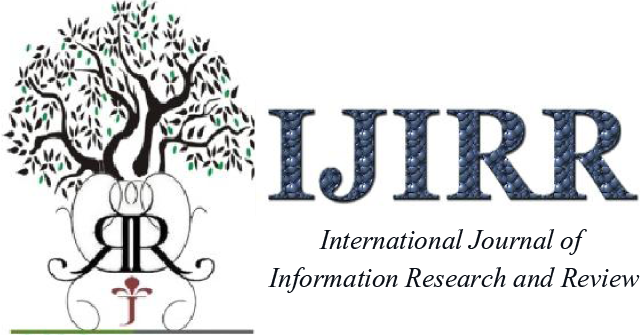





















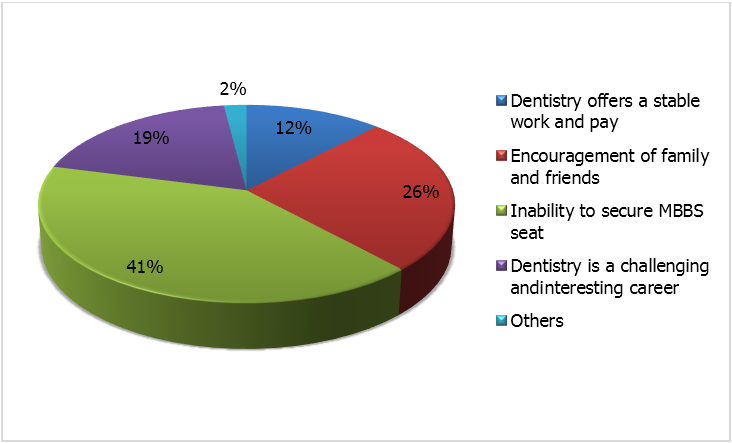
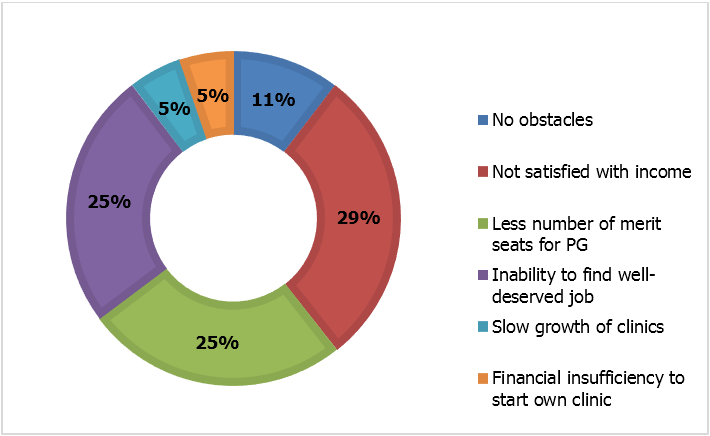
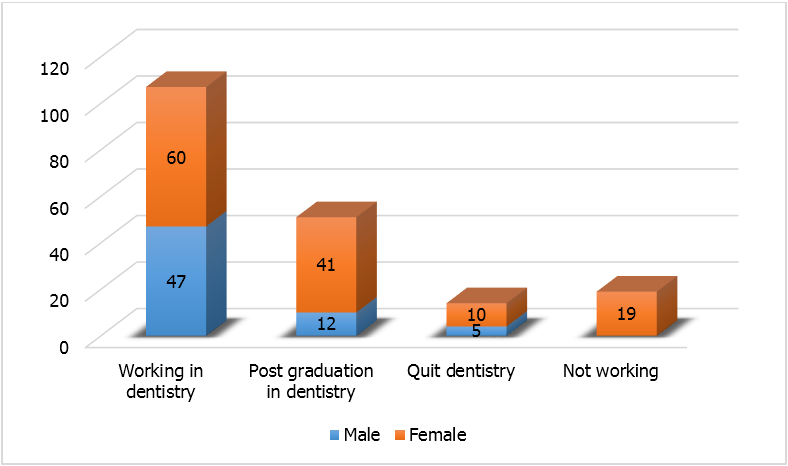
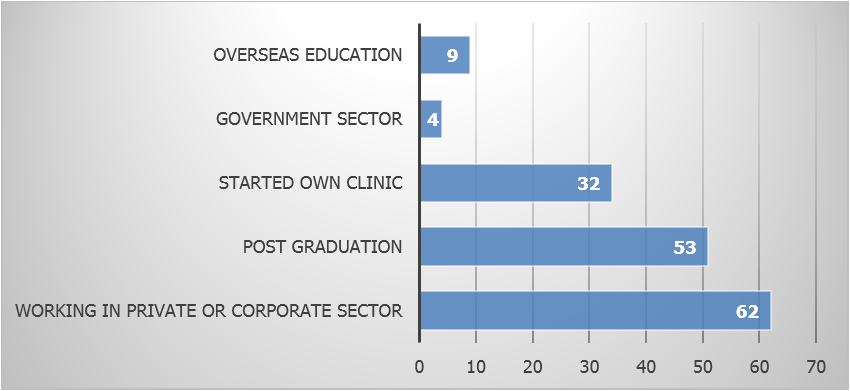
 Scientia Ricerca is licensed and content of this site is available under a Creative Commons Attribution 4.0 International License.
Scientia Ricerca is licensed and content of this site is available under a Creative Commons Attribution 4.0 International License.